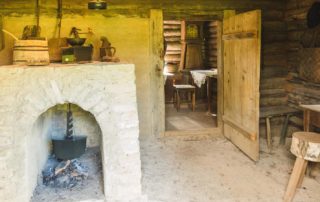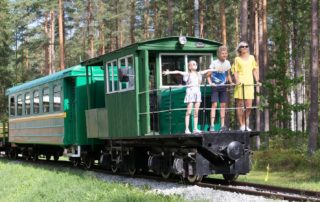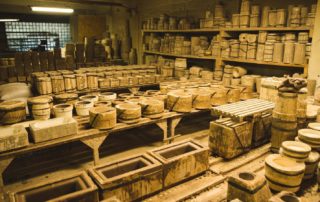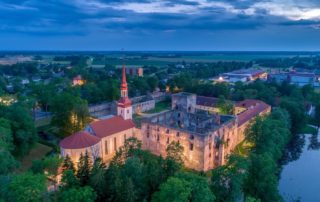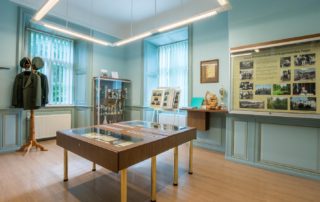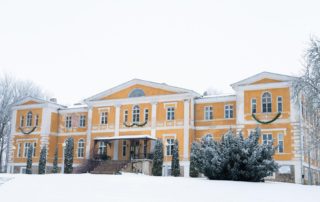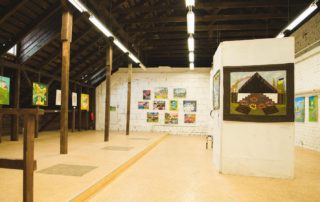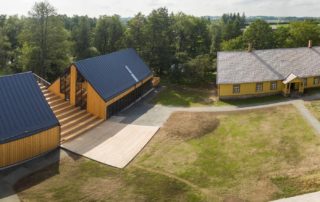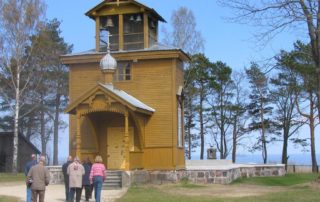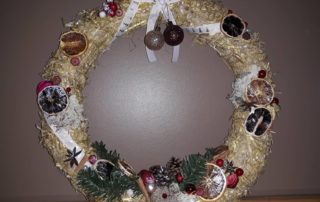Paduvere Farm Museum
The museum introduces the life led by farmers in the 18th century and the everyday lives and work of our forefathers. There are five oak sculptures created by St Petersburg artist Grigori Azarenkov by the museum. The museum is surrounded by beautiful landscapes, which make it a popular venue for folk parties and theatre performances.
Avinurme museum train
A narrow-gauge Sonda-Mustvee railway passed through Avinurme during 1926–1972. It was a true 50-year-long prosperity era for the villages located near the route. Today, a section of 178.5 metres of the former railway, the rail brigde, and the rail vehicle have been restored. All those who are interested are welcomed to take a nostalgic train ride from May to October, meaning the railway is opened when the weather is warm enough and the door of the locomotive can be opened and the railway is closed when the door of the locomotive freezes shut.
Siimusti Clay Industry
Siimusti Ceramics operates from the clay factory, which was founded in 1886 by Joosep Tiimann, a man born from a family of farmers. The location was suitable due to the clay deposits present here. At first the brick manufactury was created; afterwards they started producing oven pots and dishware. Nowadays you can get acquainted with the manufacturing process of ceramics: The pouring of clay into the mold and the firing and glazing processes. The end product can be bought onsite.
Põltsamaa Castle
The stone fortress was constructed on the banks of the Põltsamaa River already in 1272. Later on (1570–1578) the fortress was the residence of Livonia's King Magnus. Repeatedly pillaged, the castle was rebuilt by Woldemar Johann von Lauw. In the 18th century the fortress became a grand rococo-style palace. The castle and the church burnt down in 1941. Only the church was restored in 1952. The castle remained in ruins, waiting for its time. The complex is open again from the summer of 2023. The castle tower, convent building, and gate building are open to visitors, where you can find [...]
Luua Manor museum rooms
The beautiful Luua Manor is home to the museum rooms of Luua Forestry School, which showcase the history of both the school and the manor. A number of the rooms in the manor have been restored to their original state and opened up to visitors. Here you can admire the timeless beauty of the manor, find out about the history of its park and the surrounding area and take a look at awards and old school documents. There is also a large collection of stuffed birds and animals from the surrounding forests. Did you know...? *Every summer the manor takes [...]
Kuremaa Castle and Park
Kuremaa Classicist manor house was built in 1837-1843 by the von Oettingen family. The manor house was designed by the architect E. J. T. Strauss from Tartu. There is also a room for a museum in the castle which gives an overview of the region and of the history of Kuremaa Agricultural School. At present the rooms of the castle are used for organising conferences. The park rich in species descends towards lake Kuremaa which attracts visitors with its well-kept beach and possibilities for taking a rest.
Central Estonian Art Gallery pART
Gallery pART is located in the Põltsamaa Castle complex; it is an unheated extreme gallery built in a loft, and as we all know: ART is not afraid of the cold. There is a new exhibition of professional art in Gallery pART every month. Interesting information: the gallery consists of two parts; Gallery pART with contemporary lighting has a total surface are of 200 square metres. Gallery pART was established by the members of Art Society.
Palamuse O. Luts’s Parish School Museum
The historical Palamuse Parish Schoolhouse is now open to visitors as it was seen in 1895. There, you will find the classroom and the living rooms of the parish clerk, known from the movie Kevade. The heart of the museum is located in the freshly completed main building, where you will also find a classroom and a workshop. The main exhibition of the main building is meant for the whole family, reflecting the history of the Estonian parish schools through Kevade. The text introducing the entire building seems to have been written by the character Toots from the movie: you can learn [...]
Rajaküla Old Believers’ Worship House
It is believed that the Raja congregation of Old Believers was established in the first quarter of the 18th century. The congregation was given permission to build its own church only in 1879. The church was destroyed during the Second World War – the only thing left is the belfry. The present worship house has 11 rooms. In 1854–1930 Gavriil Frolov lived in the worship house. He taught children icon-writing, reading and writing in Old-Slavic, also singing based on old musical notation.
Laiuse Straw Museum
Laiuse Handwork Chamber Golden Straw or Laiuse Straw Museum offers its guests the possibility to visit an exhibition which shows straw, reed and birch bark objects made using different techniques (weaving, plaiting and intarsia), ornamental straw objects and decorations. Visitors have the possibility to buy or order souvenirs.

